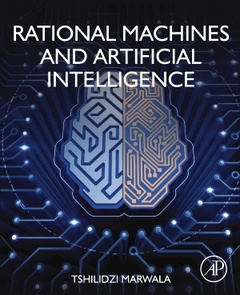Rational Machines and Artificial Intelligence
Auteur : Marwala Tshilidzi

1. Introduction to Machine and Human Rationality2. What is Rationality?3. Rational Machine4. Flexibly-bounded rationality5. Rational Expectation6. Rational Choice7. Bounded Rational Counterfactual8. Rational Opportunity Cost9. Can Machines be Rational?10. Can Rationality be Measured?11. Is machine rationality subjective?12. Group vs. individual rationality13. Human vs Machine Rationality14. Rational Markets15. Human vs Machine Ethics16. Conclusion
AppendixA: DataB: Subjectivity vs Relativity C: Algorithms
engineering, computer science, finance, social science and medicine. He has supervised 28 Doctoral students published 15 books in artificial intelligence (one translated into Chinese), over 300 papers in journals, proceedings, book chapters and magazines and holds five patents. He is an associate editor of the International Journal of Systems Science (Taylor and Francis Publishers). He has been a visiting scholar at Harvard University, University of California at Berkeley, Wolfson College of the University of Cambridge, Nanjing Tech University and Silesian University of Technology in Poland. His opinions have appeared in the New Scientist, The Economist, Time Magazine, BBC, CNN and the Oxford Union. Dr. Marwala is the author of Rational Machines and Artificial Intelligence from Elsevier Academic Press.
- Provides an introduction to the key questions and challenges surrounding Rational Machines, including, When do we rely on decisions made by intelligent machines? What do decisions made by intelligent machines mean? Are these decisions rational or fair? Can we quantify these decisions? and Is rationality subjective?
- Introduces for the first time the concept of rational opportunity costs and the concept of flexibly bounded rationality as a rationality of intelligent machines and the implications of these issues on the reliability of machine decisions
- Includes coverage of Rational Counterfactuals, group versus individual rationality, and rational markets
- Discusses the application of Moore’s Law and advancements in Artificial Intelligence, as well as developments in the area of data acquisition and analysis technologies and how they affect the boundaries of intelligent machine rationality
Date de parution : 03-2021
Ouvrage de 270 p.
19x23.3 cm
